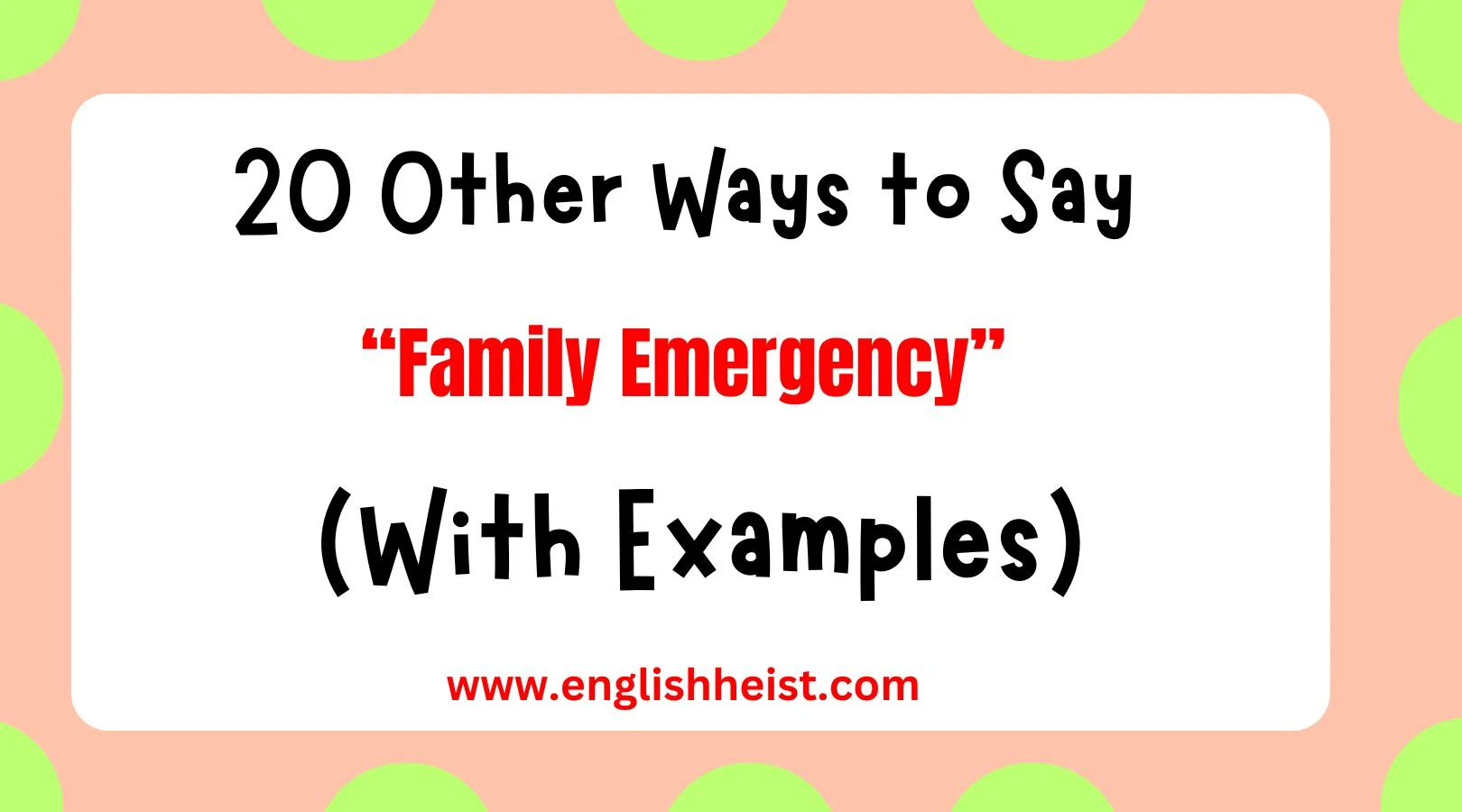When you need to express that something urgent or serious is happening within your family, sometimes using alternative phrasing can help convey the situation more thoughtfully and with sensitivity.
Whether you’re notifying a colleague, friend, or acquaintance, it’s important to keep your message clear while maintaining privacy and respect.
Here are 20 alternative ways to say “family emergency” that can help you communicate more effectively in different situations.
What Does “Family Emergency” Mean?
A “family emergency” refers to an urgent situation or crisis involving a family member that requires immediate attention, such as illness, injury, or other serious circumstances.
It is often used to explain why someone is unavailable or needs to leave abruptly. The term is broad and can encompass various scenarios, from a sudden medical crisis to an unexpected family situation.
Is It Professional/Polite to Say “Family Emergency”?
Yes! “Family emergency” is generally understood to be a respectful way to explain an urgent situation involving family.
However, in professional settings, it may sometimes be better to use more specific or formal phrases, depending on the context.
It’s always good to balance the need for privacy with the importance of providing enough information.
Pros and Cons of Saying “Family Emergency”
Pros
- Clear and direct: Everyone understands what it means.
- Respectful: It acknowledges the need to attend to urgent family matters.
- Appropriate: Often used in both personal and professional settings.
Cons
- Lacks detail: Sometimes people may want more clarity or feel the need for more specific information.
- Can feel impersonal: It might sound too formal or abrupt in more personal conversations.
Key Points to Remember
- Always consider the audience when deciding on the phrasing.
- Use alternative phrases to maintain privacy, while still conveying the urgency of the situation.
- Tone matters—choosing the right phrase ensures your message is both clear and sensitive.
Synonyms For “Family Emergency”
- Personal Emergency
- Urgent Family Matter
- Family Crisis
- Family Situation
- Family Health Emergency
- Family Matter Requiring Immediate Attention
- Unexpected Family Issue
- Family Emergency Situation
- Family Obligations
- Family Emergency Appointment
- Family Crisis Situation
- Personal Family Matter
- Critical Family Situation
- Family Emergency Obligation
- Emergency Family Circumstances
- Family Medical Crisis
- Family Tragedy
- Unexpected Family Crisis
- Family Emergency Appointment
- Family Support Situation
1. “Personal Emergency”
Scenario: When the emergency is of a personal nature and involves family but does not need to be explained in detail.
Examples:
- “I need to leave due to a personal emergency.”
- “I’m afraid I have a personal emergency to attend to.”
- “There’s a personal emergency that requires my immediate attention.”
Best Use: Professional settings where you prefer not to give specifics.
Tone: Neutral, formal.
Explanation: This is a more general term that indicates urgency without specifying family involvement.
2. “Urgent Family Matter”
Scenario: When the situation requires urgent attention but remains somewhat vague.
Examples:
- “I’m sorry, I need to leave due to an urgent family matter.”
- “There’s an urgent family matter I must attend to.”
- “I’m dealing with an urgent family matter and need to step away.”
Best Use: When you want to acknowledge the seriousness of the situation without sharing too much.
Tone: Formal, respectful.
Explanation: This phrase conveys urgency while maintaining discretion about the specifics.
3. “Family Crisis”
Scenario: When the family situation is particularly serious and may involve an immediate or life-threatening event.
Examples:
- “I have to leave due to a family crisis.”
- “There’s a family crisis that I need to attend to right away.”
- “I’m sorry to leave suddenly, but I’m dealing with a family crisis.”
Best Use: When the situation is critical or alarming but needs to be communicated clearly.
Tone: Serious, concerned.
Explanation: This emphasizes the gravity of the situation.
4. “Family Situation”
Scenario: A slightly softer way to refer to an emergency without going into details.
Examples:
- “I need to attend to a family situation, and I won’t be available.”
- “There’s a family situation that needs my immediate attention.”
- “I have a family situation to address, so I need to leave.”
Best Use: When you don’t want to sound too dramatic, but need to excuse yourself.
Tone: Neutral, calm.
Explanation: This term is a bit more casual and can refer to any serious or unexpected family event.
5. “Family Health Emergency”
Scenario: When the family emergency involves a health issue with a family member.
Examples:
- “I’m sorry, I have to leave for a family health emergency.”
- “I’ve just received a call about a family health emergency.”
- “I need to attend to a family health emergency and won’t be available.”
Best Use: When a health-related situation within the family needs to be communicated.
Tone: Concerned, urgent.
Explanation: This phrase specifies that the family emergency is health-related, which adds clarity without too much detail.
6. “Family Matter Requiring Immediate Attention”
Scenario: To convey that the matter is pressing and requires immediate action.
Examples:
- “I need to take care of a family matter requiring immediate attention.”
- “There’s a family matter requiring my immediate attention.”
- “Please excuse me, I have a family matter that demands urgent attention.”
Best Use: When you need to emphasize that the issue is pressing and can’t be delayed.
Tone: Urgent, respectful.
Explanation: This phrase highlights the immediacy of the situation without being too specific.
7. “Unexpected Family Issue”
Scenario: When the situation is unplanned and sudden.
Examples:
- “I need to leave due to an unexpected family issue.”
- “There’s an unexpected family issue I need to handle.”
- “Sorry, I just got a call about an unexpected family issue.”
Best Use: When you want to indicate that the emergency was unforeseen.
Tone: Neutral, urgent.
Explanation: This conveys the sudden nature of the situation.
8. “Family Emergency Situation”
Scenario: Another variation of “family emergency” that is a bit more formal.
Examples:
- “I’m dealing with a family emergency situation and need to leave.”
- “Unfortunately, there’s a family emergency situation that requires my attention.”
- “I’m sorry, I must take care of a family emergency situation.”
Best Use: Formal settings where you want to sound professional but need to explain your absence.
Tone: Formal, urgent.
Explanation: This is a more official-sounding phrase that emphasizes the seriousness of the situation.
9. “Family Obligations”
Scenario: When you need to leave because of a commitment or responsibility to a family member.
Examples:
- “I’m afraid I have some urgent family obligations to attend to.”
- “I need to take care of a family obligation and will be back soon.”
- “I have family obligations that I need to address immediately.”
Best Use: When the situation is urgent but also feels more like a duty or responsibility.
Tone: Neutral, respectful.
Explanation: This term conveys that the situation is important and requires your presence, though it’s slightly less urgent than a “crisis.”
10. “Family Emergency Appointment”
Scenario: When the emergency involves an urgent appointment, like with a doctor.
Examples:
- “I have a family emergency appointment I need to attend to right now.”
- “I’m afraid I have a family emergency appointment to go to.”
- “Please excuse me, I need to leave for a family emergency appointment.”
Best Use: When the emergency involves a scheduled or urgent family-related appointment.
Tone: Formal, respectful.
Explanation: This phrasing suggests that there’s an actual appointment, adding a sense of formality to the urgency.
11. “Family Crisis Situation”
Scenario: When the emergency is severe and urgent, requiring immediate action.
Examples:
- “I need to leave for a family crisis situation.”
- “I’m sorry, I have to go—there’s a family crisis situation that needs my attention.”
- “I’m dealing with a family crisis situation right now and will be unavailable.”
Best Use: When the situation is urgent and serious, and you need to excuse yourself quickly.
Tone: Serious, urgent.
Explanation: This phrase stresses the importance and urgency of the family situation.
12. “Personal Family Matter”
Scenario: When you need to handle something urgent within the family, but prefer to keep it private.
Examples:
- “I need to leave due to a personal family matter.”
- “There’s a personal family matter I must attend to immediately.”
- “Apologies, but I have a personal family matter that needs my attention.”
Best Use: When you want to keep the specifics private but need to communicate urgency.
Tone: Neutral, respectful.
Explanation: This phrase conveys that the matter is personal and urgent, without delving into details.
13. “Critical Family Situation”
Scenario: When the family issue is serious and requires immediate action or presence.
Examples:
- “I have a critical family situation and need to leave right away.”
- “There’s a critical family situation that demands my attention.”
- “I’m dealing with a critical family situation, so I won’t be available.”
Best Use: When you need to stress that the situation is severe and urgent.
Tone: Serious, urgent.
Explanation: This phrase emphasizes the high level of importance of the situation, making it clear that it requires immediate attention.
14. “Family Emergency Obligation”
Scenario: When you are required to attend to a family emergency as part of a responsibility or duty.
Examples:
- “I have a family emergency obligation that I need to handle.”
- “I must attend to a family emergency obligation at this time.”
- “I’m sorry, but I need to take care of a family emergency obligation.”
Best Use: When the emergency is unavoidable and you are responsible for taking action.
Tone: Neutral, formal.
Explanation: This phrase suggests that the family matter is not just urgent but also a duty or responsibility you must fulfill.
15. “Emergency Family Circumstances”
Scenario: A situation where unexpected circumstances in the family require immediate attention.
Examples:
- “I have to leave because of emergency family circumstances.”
- “I’m dealing with some emergency family circumstances right now.”
- “Due to emergency family circumstances, I won’t be available for the rest of the day.”
Best Use: When you need to mention that the situation involves unforeseen family matters.
Tone: Formal, urgent.
Explanation: This phrase indicates that something sudden and significant has occurred within the family that demands immediate attention.
16. “Family Medical Crisis”
Scenario: When the emergency is specifically health-related within the family.
Examples:
- “I’m sorry, I need to leave for a family medical crisis.”
- “I have to take care of a family medical crisis, so I’ll be unavailable.”
- “There’s a family medical crisis I must attend to immediately.”
Best Use: When the family emergency is health-related, such as a serious illness or injury.
Tone: Serious, concerned.
Explanation: This phrase emphasizes the medical nature of the situation, making it clear that it’s urgent.
17. “Family Tragedy”
Scenario: When the situation is deeply serious or involves a loss, such as the death of a family member.
Examples:
- “I need to leave due to a family tragedy.”
- “There’s been a family tragedy, and I must attend to it immediately.”
- “I’m afraid there’s been a family tragedy, and I need to take care of it.”
Best Use: When the situation involves grief or loss and requires your immediate presence.
Tone: Sensitive, serious.
Explanation: This term is typically used for serious, often tragic events, and conveys the emotional weight of the situation.
18. “Unexpected Family Crisis”
Scenario: When a family issue arises without warning and needs immediate attention.
Examples:
- “I’ve just been informed of an unexpected family crisis.”
- “There’s an unexpected family crisis I need to attend to right now.”
- “I need to leave due to an unexpected family crisis.”
Best Use: When the emergency was not anticipated and is pressing.
Tone: Urgent, slightly informal.
Explanation: This phrasing highlights the suddenness and importance of the issue, suggesting that it was unplanned.
19. “Family Emergency Appointment”
Scenario: When the emergency involves a scheduled or urgent appointment related to a family member’s well-being.
Examples:
- “I have to leave for a family emergency appointment.”
- “There’s an urgent family appointment I must attend to.”
- “I have an emergency family appointment that requires my immediate attention.”
Best Use: When the emergency is tied to a medical or urgent family-related appointment.
Tone: Formal, professional.
Explanation: This term indicates that the emergency involves an appointment that requires immediate action, such as with a doctor or specialist.
20. “Family Support Situation”
Scenario: When you need to provide support to a family member during a difficult time.
Examples:
- “I need to attend to a family support situation right now.”
- “There’s a family support situation that requires my presence immediately.”
- “I’m afraid I need to leave for a family support situation.”
Best Use: When you need to provide emotional, practical, or physical support to a family member.
Tone: Caring, concerned.
Explanation: This phrase is often used when the emergency involves supporting a family member, such as during a health crisis or after a loss.
Conclusion
Whether you’re facing a critical health situation or an unexpected family crisis, these 20 alternative phrases can help you communicate the urgency and importance of the matter with care and sensitivity.
Choosing the right phrase allows you to convey the seriousness of the situation while respecting privacy and maintaining professionalism.

Mia Rose is your go-to platform for mastering the English language. Through clear, concise lessons and expert advice, Mia makes learning grammar, vocabulary, and writing skills easy and enjoyable. Whether you’re a beginner or looking to refine your skills, English Heist helps you communicate confidently and effectively.













